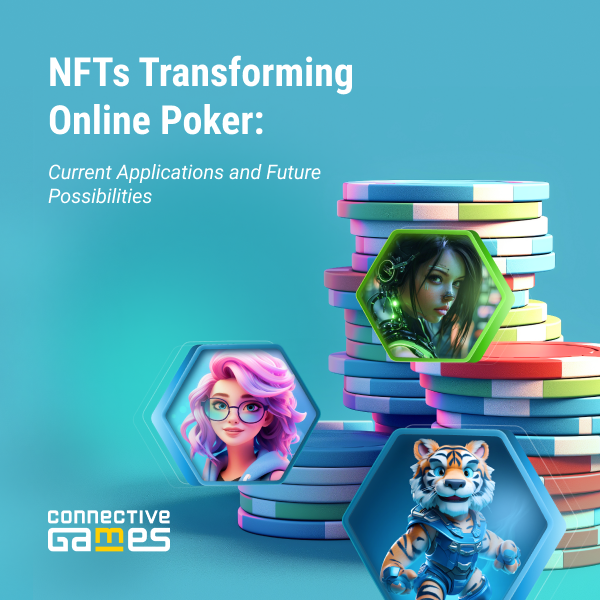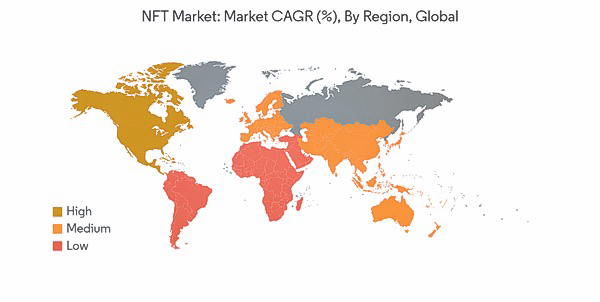

NFTs Transforming Online Poker: Current Applications and Future Possibilities
The online poker industry has always embraced innovation, evolving from virtual poker rooms to mobile gaming. Now, a new technology—non-fungible tokens (NFTs)—is set to redefine the way we play and experience online poker. NFTs, unique digital assets verified by blockchain technology, have quickly expanded from digital art and gaming into the realm of poker, bringing unprecedented opportunities for players.
According to Research and Markets’ report, the NFT Gaming Market size is estimated at USD 471.90 billion in 2024, and is expected to reach USD 942.58 billion by 2029, growing at a CAGR of 14.84% during the forecast period (2024-2029). This is with North America to hold the largest Market share.

NFTs introduce a new level of ownership, scarcity, and personalization in online poker. Players can now own, trade, and collect unique digital items like customized avatars or exclusive tournament tokens, enhancing their gaming experience. This integration offers exciting possibilities, from dynamic in-game assets to player-owned poker rooms, making every hand and table unique.
This article explores how NFTs are currently used in online poker and potential future applications. Whether through exclusive digital cards, decentralized platforms, or cross-platform assets, NFTs promise a new era of creativity and engagement in online poker.
Current Uses of NFT Technology in Online Poker
Unique Player Avatars and Accessories
Virtue Poker, a decentralized platform on the Ethereum blockchain, integrates NFTs as unique player avatars and accessories. Players can purchase or earn these NFTs, which represent their in-game identity and can indicate a player's status, achievements, or participation in events, enhancing the gaming experience.
Digital Card Ownership
Some platforms are experimenting with NFT-based playing cards, where each card is a unique NFT. Players can own, trade, and use these cards across different games, ensuring that each hand is distinctive. This concept is still developing but hints at a more customizable and collectible poker experience.
Tournament Entries and Rewards
No Limit Coin, a cryptocurrency poker platform, uses NFTs as tournament entry tokens and rewards. Players can earn or buy NFT tokens for access to exclusive tournaments. NFT-based rewards, like trophies or special edition cards, add prestige and collectibility to the poker world.
NFT Collections
NFTs allow poker platforms to release exclusive collections tied to their projects. These unique and collectible sets can hold significant value, with limited editions enhancing their appeal. For instance, the World Poker Tour launched an NFT collection showcasing iconic tournament moments, giving fans and players the opportunity to own a piece of poker history while enhancing engagement through NFTs that offer access to special events or in-game perks.
Future Applications of NFTs in Online Poker
Dynamic In-Game Assets
NFTs could enable dynamic in-game assets that evolve based on a player's performance. For instance, an NFT card or avatar might gain attributes or value as the player reaches milestones. This gamification could deepen the poker experience, making each player’s journey unique.
Player-Owned Poker Rooms
NFTs could allow players to own shares or entire online poker rooms by tokenizing them. This would enable buying, selling, and trading of ownership stakes, creating new revenue streams and fostering community-driven ecosystems where players have a stake in the platform's success.
Cross-Platform Integration
With increasing NFT interoperability, players could use their digital assets across various poker platforms. An NFT avatar or special edition card could be utilized in multiple games, enhancing the value of NFTs and promoting collaboration among platforms.
Decentralized Governance and Revenue Sharing
NFTs could facilitate decentralized governance models, granting voting rights to players on platform decisions like tournament structures and profit distribution. NFT holders could also receive a share of the platform's revenue, fostering a more equitable poker ecosystem.
Exclusive Poker Experiences
NFTs could unlock unique poker experiences, such as private games with professionals, access to VIP lounges, or invitations to live events. These tokenized experiences would provide players with memorable opportunities beyond the virtual realm.
NFT Trading
An integrated NFT marketplace within poker platforms would create earning opportunities for players and the platform itself. Players could buy, sell, or trade NFTs, generating commissions for the platform. Additionally, renting NFTs could allow players to earn passive income while maintaining ownership, attracting both poker enthusiasts and NFT traders to the platform.
Challenges and Considerations
Integrating NFTs into online poker presents several challenges:
Regulatory Hurdles
The regulatory landscape for online gambling is complex, and adding NFTs introduces further complexity. Addressing the legality of NFT transactions, cryptocurrency use, and potential illicit activities will require collaboration between poker platforms, legal experts, and regulators.
Volatility of Cryptocurrency Markets
NFTs are often bought with volatile cryptocurrencies, which can affect their value. This volatility could impact player satisfaction if the value of NFTs fluctuates significantly. Platforms may need to offer stablecoin options or protective measures.
User Experience and Accessibility
NFTs should enhance, not complicate, the gaming experience. Platforms need user-friendly interfaces and educational resources to make NFTs accessible and ensure they do not create barriers for players.
Security and Fraud Prevention
NFTs add new security risks. Platforms must implement robust measures to protect against theft and fraud, including secure wallets, data encryption, and transaction transparency.
Conclusion
NFTs are set to transform online poker, allowing players to personalize and enhance their gaming experiences. With NFTs, players can own unique in-game assets—ranging from avatars to tournament access tokens—introducing new dimensions of status, achievement, and exclusivity. Current applications demonstrate increased engagement, while future possibilities like dynamic assets, player-owned poker rooms, and decentralized governance promise a more connected poker ecosystem.
As NFTs evolve, they have the potential to revolutionize not just how poker is played, but also how communities interact, invest, and collaborate in this beloved game. The integration of NFTs into online poker signifies the start of a new era, redefining the landscape for players, traders, and platforms alike.
Contact Connective Games Malta to learn about our product and services: [email protected]
